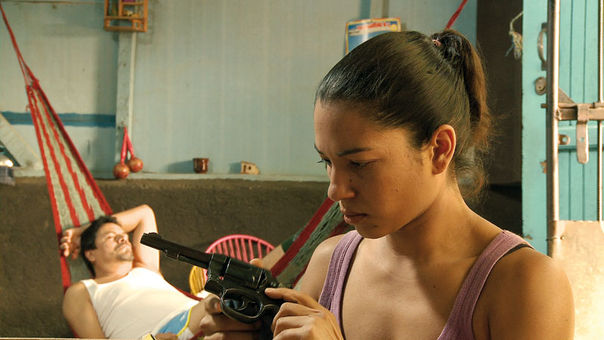Road to the Oscars
With LA YUMA, a film that depicts the daily lives of Nicaraguans, French-born filmmaker Florence Jaugey leaves her mark on the cinema of Latin America.

LA YUMA
12 years ago, Florence Jaugey first dared to offer hope for the Nicaraguan film industry when her short film CINEMA ALCÁZAR (1997) was selected for the Berlin International Film Festival. Sending the screener by mail, the French director, who had been living in Nicaragua for more than two decades, feared that her audiovisual proposal wouldn't even make it there. “Berlin was like a fairy tale in 1998. When I sent the tape by mail, I thought that the film might be lost on the way. But it arrived, CINEMA ALCÁZAR was selected, I was invited to Berlin and I won a Silver Bear for Best Short Film. From then on, I knew I could make a feature film, because now I had more credibility”.
Since then, Jaugey has become established on the international market, so much so that her first film LA YUMA has recently been sent in by Nicaragua as the national entry for the Best Foreign Language Film. The nominations will be announced on the 25th of January 2011 at the Academy Awards of Motion Picture Arts and Sciences, which will celebrate its 83th edition. “Yes, LA YUMA was selected by them. To represent Nicaragua is already recognition enough. It is an honour, and if we receive a nomination, that would be something exceptional. It would not only give recognition to the film, but also to the rebirth of Nicaraguan cinema”, says the filmmaker.
The Talent Project Market Florence’s second visit to the Berlinale took place in 2005, when she decided to develop LA YUMA as a feature film. It is a story about a rebellious young woman from one of the poorest neighborhoods of Managua who dreams of becoming a boxer in a society that doesn't accept women in certain fields. After her project was not selected for the World Cinema Fund, Florence got the chance to attend the Berlinale Talent Campus. LA YUMA was part of the Talent Project Market, where Florence, as she claims, learned to sell her film. “Being part of the Talent Project Market taught me to defend my work in forums and film markets, because I had never done that before. And when the director is also working as producer, as in my case, you have to do it right. In that sense, it was very useful, because the Berlinale Co-Production Market is really important – nobody there does things half-heartedly. I left there a lot stronger”.
Thanks to festivals Florence regards her consistent participation in festivals as vital for the development of the project and the film’s eventual recognition: These festivals helped her to realize her dream and made LA YUMA possible. “In Nicaragua there is no funding for films, so I had to go knocking on doors at as many places I possibly could. Private production of a debut film project has little chance of financing, so you must pass through these mechanisms. Some meetings worked out for us, and so we were able to film LA YUMA.” But not everything was going smoothly: despite the wishes of the director of photography, the only option was to shoot on video and then transfer to 35mm. “It would have been extremely costly to shoot it on film, because the money was collected slowly, and when we had the funds it was barely enough to shoot the film digitally. In fact we did not even have money for post-production”, Florence says. She worked with a cast that had no acting experience, with Mexico, Colombia and France as co-producers, and with an audiovisual proposal that was shot entirely in Nicaragua to preserve the essence of the story.
Born out of adversity The message of the story is that it's possible to succeed in spite of adversity – a statement that was also valid behind the scenes. “In that sense there are similarities between the production story and the story of the film's protagonist: Everything was extremely difficult, but we decided not to give up. Yuma is a woman who was born into total adversity, but she does not agree with society, and with her own power she changes her destiny – and this was what we did too”.
Jaugey's idea was to make a story that reflected the reality experienced by most of Nicaragua’s youth. “I wanted to raise a voice for all those people who had been silenced, and this generated a positive energy”, she says excitedly. And with good reason: LA YUMA is the first fiction feature film that was produced in Nicaragua for 20 years. Nowadays, Florence believes, Nicaraguans do not think making films in their country is going to be easy, but they do believe that it is possible. They start to realize that Nicaragua can be represented through others’ films as well, and they expect that their government considers film as a new-born industry in need of support, she adds. Florence thinks that being independent has its price but that you achieve a greater amount of creative freedom. Although the director is usually required to do all kinds of things, “which is limiting in some sense, it also allows for clarity in the projects. This is why I think that the topic of the next Berlinale Talent Campus – Filmmakers Positioning Themselves – is very important, because it forces you to experiment and take risks”.
Coming back to Berlin? “Of course it would be a dream”, Florence replied. “I would love to return to Berlin, I enjoyed it a lot, there are tremendous opportunities. All opportunities and all the meetings are important, even though no agreements are signed. Now I know that afterwards, I will find the people again. Although it is very difficult, it’s great to be in the industry”.

